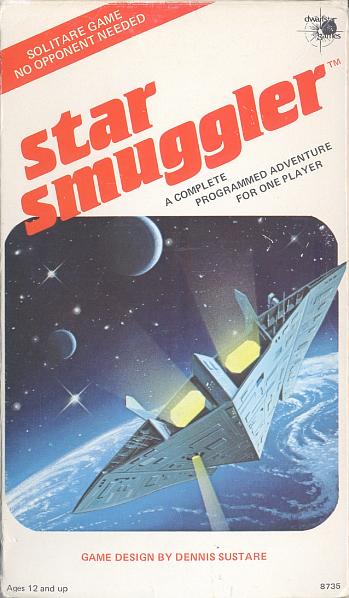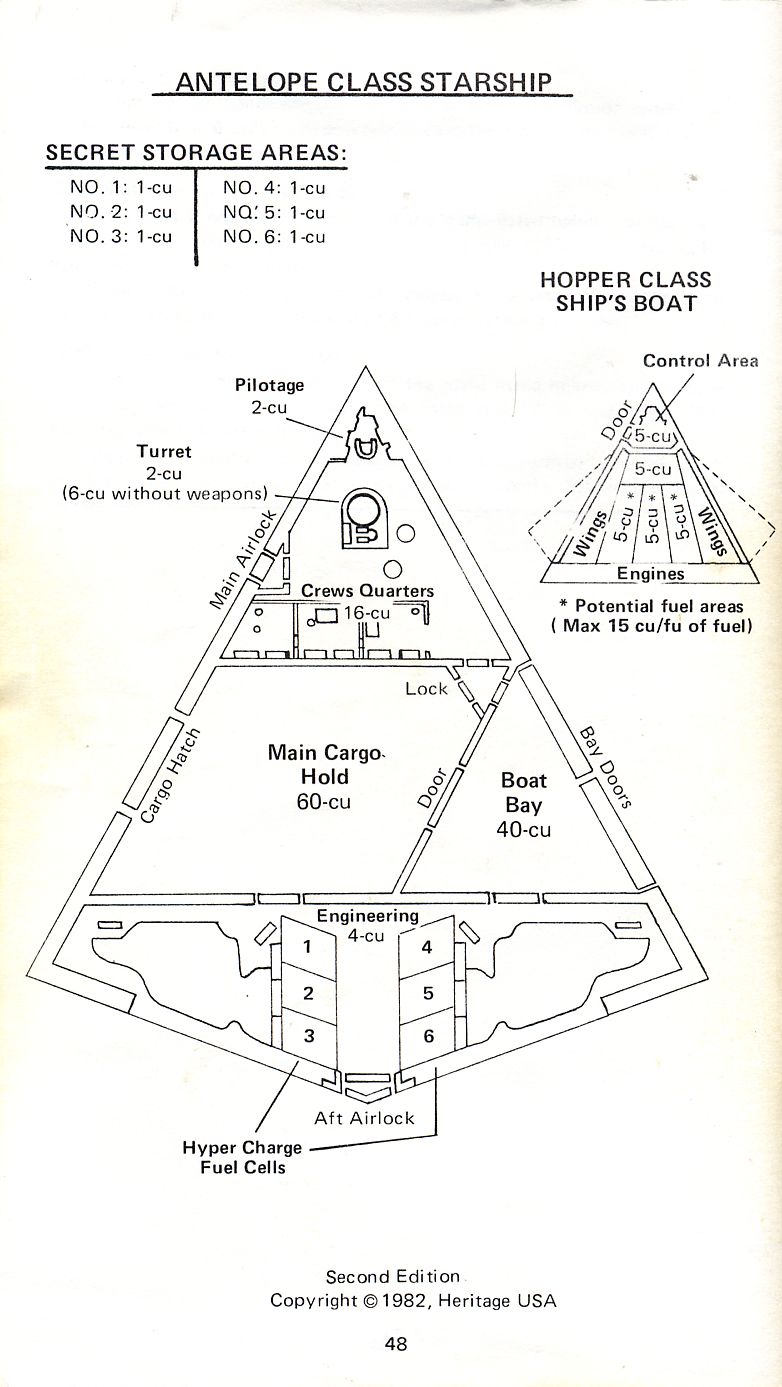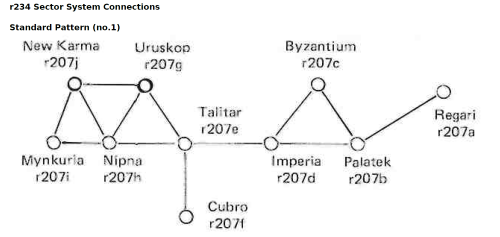 The tramp freighter plying the star lanes, struggling to make ends meet, taking on illicit cargo, avoiding the law while trying to stay one jump ahead of debt collectors…is there anything more iconic in science fiction? This is a well-tapped vein that shows up everywhere from Northwest Smith to Han Solo to Mal Reynolds. It’s the reason for the success of the video game Elite, and represents the platonic ideal of a Traveller campaign. Trying to fit the combination of exploration, trade craft, and combat inside of a pen and paper solitaire game makes for a serious challenge, but it’s one that DwarfStar games was able to overcome back in 1982 with Star Smuggler, by Dennis Sustare.
The tramp freighter plying the star lanes, struggling to make ends meet, taking on illicit cargo, avoiding the law while trying to stay one jump ahead of debt collectors…is there anything more iconic in science fiction? This is a well-tapped vein that shows up everywhere from Northwest Smith to Han Solo to Mal Reynolds. It’s the reason for the success of the video game Elite, and represents the platonic ideal of a Traveller campaign. Trying to fit the combination of exploration, trade craft, and combat inside of a pen and paper solitaire game makes for a serious challenge, but it’s one that DwarfStar games was able to overcome back in 1982 with Star Smuggler, by Dennis Sustare.
You can download and print a full copy of this game here.
In Star Smuggler, the player takes on the role of Duke Springer, a “starship era soldier of fortune” who pilots his Antelope Class trading vessel throughout the Sector searching for ways to pay down the mortgage on his ship. Through the course of play, you stumble onto possible cargos, hire additional crew, take on passengers, and generally get into the sorts of trouble that make life interesting for characters like Duke.
 The game comes with the standard two book set-up, a Rule book and an Event book. The Rules book states that you don’t need to read all of the rules to begin play, and that is generally true. Diving into the first paragraph of the Events book helps the potential player focus only on the most important rules first. As the game grows more complex, it does a fine job of referencing where to find the rules for additional situations. You don’t need to know the rules for crewmembers until you hire one, and when you meet one in the course of play, the Event book includes a reference to the paragraph for rules on crewmembers.
The game comes with the standard two book set-up, a Rule book and an Event book. The Rules book states that you don’t need to read all of the rules to begin play, and that is generally true. Diving into the first paragraph of the Events book helps the potential player focus only on the most important rules first. As the game grows more complex, it does a fine job of referencing where to find the rules for additional situations. You don’t need to know the rules for crewmembers until you hire one, and when you meet one in the course of play, the Event book includes a reference to the paragraph for rules on crewmembers.
That said, there are a few areas where player can expect to do a little bit of searching for general rules on moving about the Sector, handling combat, and making contacts. For example, when ready to leave your starting planet for the first time, you will have to sit down and read up on fuel costs, travel times, and the like, without being pointed in the right direction.
The game includes a number of clever subsystems that elevate it from a simple “Choose Your Own Adventure” and into a game of true exploration, while still narrowing down the player choices to reasonable numbers of outcomes. One look at the Sector map shows the connections between each star system, for example, along with the paragraph to reference when arriving in-system. Each system has its own little back story, politics, and events, all of which are slowly revealed during play.

Once Duke arrives in system, the player is given directions to lay out the planets located within that system. Most systems have just one planet, but some have tow, or even a belt of mining asteroids. After landing, Duke can travel about the planet surface either by hopping his ship, or hiring transport, or even walking if he has no other choice. The locations on the planets help drive the contacts Duke might make, the cargo he might acquire, and the other random events that make this a game of true exploration. The use of cards allows for a wide variety of planetary arrangements and makes the game feel much larger than the limited number of components implies.

Each system and each planet has its own table used to generate potential contacts that might offer Duke a shipping contract, hit him up for bribes, or even rob him. They also feature their own events which provide the bulk of the descriptive content of the game and lend each system its own flavor. Regari is a crumbling empire, Uruskop is isolationist and dangerous to go alone, Nipna is at war with Mynkuria. Each of these play a role as you direct Duke about the map and force you to make difficult chocies. It may be possible to win – that is to say, earn the 140,000 credits plus interest – to pay off the loan on your ship, but I doubt it. In my play-throughs the only way to stay ahead of the debt collectors, who are the scariest NPCs you can encounter, was to take risks, smuggle dangerous goods, and try to slip into the dangerous ports with as much backup as possible.
The game itself is challenging, and features a high chance of death early on. Running around the Pavonis Sector is a good way to get robbed and killed. Once you have a little backup, though, the game opens up and you find yourself having an easier time surviving, but a harder time staying ahead of the debt collectors. Duke gets shaken down by customs agents and has his cargo confiscated on a regular basis to keep things interesting.
If there’s one weakness to this game, it’s the complexity. Although the game play is relatively simple, a fact enhanced by the streamlined crew record, each week of in-game play adds a few more items to track and most of those have lists of conditionals to remember as well. You might take on a small cargo of illegal gems that are worth X to Y if you can get there by Z, otherwise they are only worth A to B. One or two of those are easy to track, but once Duke has a hold full of them, and has his ship staffed by men wanted in six systems and robots stolen from two others, it can get to be too much to handle. Unfortunately, turning down these conditionals is a recipe for disaster, as the easier payloads simply don’t pay as much.
The game also plays relatively slow. The first week of game play took me two hours due to the constant rule hunting and checking and verifying that I hadn’t missed anything. Once familiar with the basics things pick up, but it still takes almost an hour to get through a few weeks of play – meaning that a full year of Duke’s adventures could well stretch out to a full 25-50 hours of game time. Not a bad value for a free game.
It all adds up to a complete game that’s a little too complex, but well worth a look for anyone who wants the Traveller experience condensed down into a solitaire game that they can pick up and fiddle with for a few hours at a stretch.
This looks very neat. Could you check your link in the paragraph stating you can download?
Would love to check this out.
Found it. The host requests not linking to the downloads directly.
https://dwarfstar.brainiac.com/ds_distribution.html
Try this: (https://dwarfstar.brainiac.com/ds_starsmuggler.html). The components are at the bottom of the page.
Definitely worth a look
Thanks, guys. I updated the link accordingly.